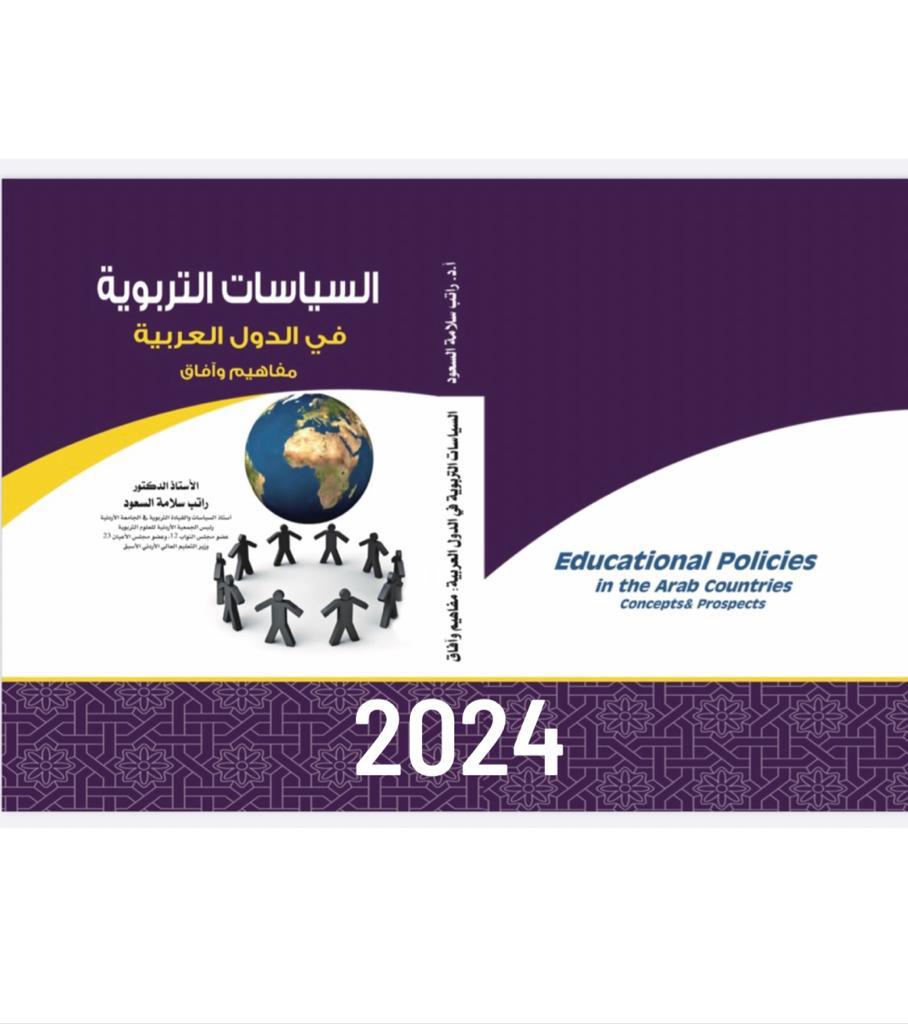Professor Dr. Rateb Al-Saud has published a book titled "Educational Policies in Arab Countries: Concepts and Perspectives." This book delves into the realm of educational policies, a subject of great interest to researchers, particularly in the Arab world. However, the magnitude of challenges, the depth of problems, and the increasing pressures to address these challenges have made educational policies a subject of significant importance. This book, "Educational Policies in Arab Countries: Concepts and Perspectives," is intended for specialized readers in the Arab world, aiming to provide them with in-depth knowledge about educational policies, how they are formulated, the forces (official and unofficial) that shape them, methods of analysis, the role of education in official Arab discourse, the intersection of education and politics, examples of educational policies in some advanced countries, and the formation of a future vision for educational policies in the Arab world.
This book represents a new and qualitative addition to the field of educational management and leadership, a field that Dr. Al-Saud has been actively building for decades, drawing from his extensive expertise in public administration, educational policies, and educational leadership. His practical experience in educational leadership spans nearly five decades, starting as the principal of a high school in the field of general education and progressing through various administrative positions in higher education. His journey also includes serving as a member of the Education and Higher Education Committee in the Twelfth Jordanian Parliament, the Twenty-Third Jordanian Senate, and culminated in his role as Minister of Higher Education. These administrative experiences, combined with his academic teaching experience across the bachelor's, master's, and doctoral levels, as well as his supervision of over 130 doctoral dissertations at seven prestigious Arab universities, have enriched the content of this book.
The book provides readers with an in-depth understanding of educational policies, their formulation, the forces (official and unofficial) that shape them, methods of analysis, the role of education in official Arab discourse, the intersection of education and politics, an overview of educational policies in Arab countries, and a prospective outlook on the future of educational policies in Arab countries in general.
This academic achievement is presented in fourteen chapters:
Chapter 1: The Concept of Educational Policies (Meaning, Nature, Justifications, Characteristics)
Chapter 2: Formulating Educational Policies (Forces Contributing to the Formulation of Educational Policies, Factors and Variables Affecting the Formulation of Educational Policies)
Chapter 3: Implementing, Evaluating, and Developing Educational Policies (Implementing Educational Policies and Their Challenges, Evaluating the Implementation of Educational Policies)
Chapter 4: Analyzing Educational Policies (Introduction to the Process of Analyzing Educational Policies, Approaches to Analyzing Educational Policies, Levels of Application)
Chapter 5: Education, Politics, and Policy (The Concept of Education, The Concept of Politics, Educational Policy, Political Education)
Chapter 6: Education and Teaching in Arab Political Discourse (Education and Teaching in the Discourses of High Political Leaders, in Ministerial Councils, and by Education Ministers)
Chapter 7: Educational Policies in Jordan (Origins, Legislative and Regulatory Development, Educational Achievements During the First Century, Educational Expenditure Policies in Jordan, Factors Affecting Educational Policies, Educational Philosophy and Objectives, Principles of Educational Policies, Challenges of Educational Policies and Ways to Address Them, Educational Reform in Jordan)
Chapter 8: Educational Policies in Arab Asian Countries (Arab Crescent Countries: Syria, Iraq, Lebanon, Palestine, Arab Gulf Countries: Saudi Arabia, Kuwait, the UAE, Qatar, Bahrain, Oman)
Chapter 9: Educational Policies in Arab African Countries (Nile Valley: Egypt, Sudan, Somalia, Djibouti, and the Maghreb: Tunisia, Algeria, Morocco, and Other Arab Countries: Yemen, Libya, Mauritania, Comoros)
Chapter 10: Pre-school Education Policies in the Arab World (Evolution of the Concept of Pre-school Education and Kindergartens in the Arab World, Importance of Pre-school Education, Pre-school Education Policies in the Arab World)
Chapter 11: Public Higher Education Policies in the Arab World (Evolution of Public Higher Education Policies in the Arab World, the Process of Formulating Public Higher Education Policies in Arab Countries and Their Analysis, Student Admission Policies, and Funding Policies)
Chapter 12: Private Higher Education Policies in the Arab World (Evolution of the Concept of Private Universities in Arab Countries, Policies for Private Higher Education (Non-Governmental) in Arab Countries, Advantages and Disadvantages of Private Universities in Arab Countries)
Chapter 13: Vocational and Technical Education Policies in the Arab World (The State of Arab Vocational and Technical Education and Its Significance, Vocational and Technical Education Policies in the Arab World, Ways to Improve Arab Vocational and Technical Education)
Chapter 14: Future Visions for Educational Policies in the Arab World (Current State of Educational Policies in Arab Countries, Challenges Faced by Educational Policies in Arab Countries, Future Scenarios for Educational Policies in Arab Countries).
This comprehensive work by Professor Dr. Rateb Al-Saud represents a significant contribution to the field of educational policies and will be a valuable resource for scholars, educators, and policymakers in the Arab world and beyond.
